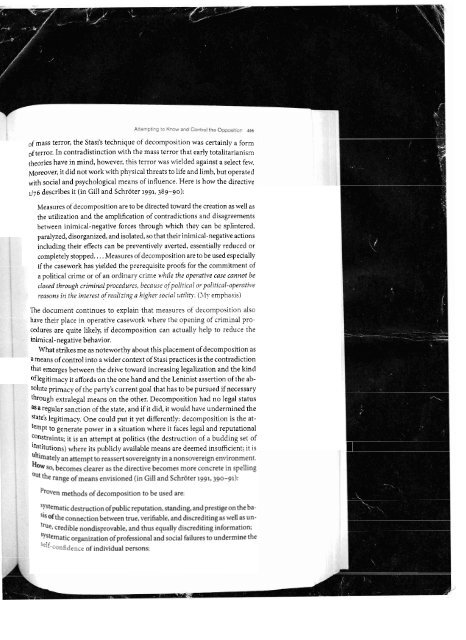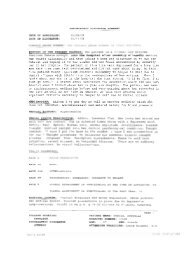C - Organized Mobbing
C - Organized Mobbing
C - Organized Mobbing
Create successful ePaper yourself
Turn your PDF publications into a flip-book with our unique Google optimized e-Paper software.
,f mass terror, the Stasi's technique of decomposition was certainly a form<br />
,fterror. In contradistinction with the mass terror that early totalitarianism<br />
theories have in mind, however, this terror was wielded against a select few.<br />
Moreover, it did not work with physical threats to life and limb, but operated<br />
with social and psychological means of influence. Here is how the directive<br />
1/76 describes it (in Gill and Schroter 1991,389-90):<br />
Measures of decomposition are to be directed toward the creation as well as<br />
the utilization and the amplification of contradictions and disagreements<br />
between inimical-negative forces through which they can be splintered,<br />
paralyzed, disorganized, and isolated, so that their inimical-negative actions<br />
including their effects can be preventively averted, essentially reduced or<br />
completely stopped. . . . Measures of decomposition are to be used especially<br />
if the casework has yielded the prerequisite proofs for the commitment of<br />
a political crime or of an ordinary crime while the operative case cannot be<br />
closed through criminal procedures, becarlse ofpolitical or political-operative<br />
reasons in the interest ofrealizinga higher social utility. (117 emphasis)<br />
The document continues to explain that measures of decomposition also<br />
have their place in operative casework where the opening of criminal procedures<br />
are quite likely, if decomposition can actually help to reduce the<br />
inimical-negative behavior.<br />
What strikes me as noteworthy about this placement of decomposition as<br />
ameans of control into a wider context of Stasi practices is the contradiction<br />
that emerges between the drive toward increasing legalization and the kind<br />
oflegitimacy it affords on the one hand and the Leninist assertion of the ab-<br />
Solute primacy of the party's current goal that has to be pursued if necessary<br />
through extralegal means on the other. Decomposition had no legal status<br />
regular sanction of the state, and if it did, it would have undermined the<br />
state's legitimacy. One could put it yet differently: decomposition is the attempt<br />
to generate power in a situation where it faces legal and reputational<br />
'Onstraints; it is an attempt at politics (the destruction of a budding set of<br />
institutions) where its publicly available means are deemed insufficient; it is I<br />
'ltkately an attempt to reassert sovereignty in a nonsovereign environment.<br />
SO, becomes clearer as the directive becomes more concrete in spelling<br />
Out the range of means envisioned (in Gill and Schroter 1991,390-91):<br />
Proven methods of decomposition to be used are:<br />
'ystematic destruction ofpublic reputation, standing, and prestige on the ba-<br />
s's the connection between true, verifiable, and discrediting as well as un-<br />
-<br />
true, credible nondisprovable, and thus equally discrediting information;<br />
. .<br />
Systematic organization of professional and social failures to undermine the<br />
of individual Dersons;





